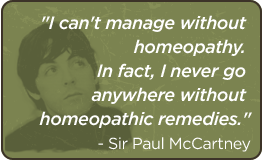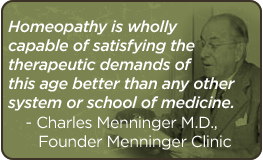Homeopathy and Chronic Illness
Homeopathy is a system of natural medicine that is highly effective in many health challenges but where it really shines is in the treatment of chronic illness.
It is also useful in first-aide, such as minor injuries, or acute illness, like influenza. Samuel Hahnemann (1755-1843), the founder of homeopathy, believed that homeopathic medicines should fit the entire person, thus making it a holistic medicine that treats the body, mind and spirit. Many homeopaths of today practice just that way, looking for the single homeopathic remedy that fits the entire case. This includes looking at the current symptoms, the mental-emotional state and the underlying predisposition that each person is born with. And that’s the way I practiced for many years and, like many homeopaths, I had very good success in a wide variety of situations.
I then had two revelations thanks to Tinus Smits, MD and Manfred Mueller, CCH, RSHom(NA). The first was that Hahnemann would sometimes prescribe more than one remedy. Many teachers today say that only one can be used at a given time but this conflicts with the case records of the founder of our profession. This gave me more freedom in my selection of remedies.
Second, Hahnemann talked extensively about factors that interfered with successful treatment. In Hahnemann’s time these included things like living in a damp basement or taking the medical treatments prescribed in that day like mercury and arsenic. Today, these interfering factors may be less noxious than mercury in our medicines but our exposure is much more prevalent with the average person taking more pharmaceutical drugs and being exposed to many more toxins in our environment including our food, air, lawns and gardens. The medications of today have more subtle side effects, our toxic exposure is ubiquitous and our sensitivity is greater. As a result, we have rising rates of multiple sclerosis, lupus, chronic fatigue syndrome, fibromyalgia, autism, asthma, Parkinson’s Disease, ADHD, Learning Disorders, multiple chemical sensitivity and rheumatoid arthritis, just to name a few. However, there are many options for clearing or countering this exposure and for helping the body fortify itself against this onslaught.
In my opinion, modern homeopathy must take all these things into consideration. In short, whether I am seeing someone in my Park City, UT office or doing a telephone consultation, I focus my analysis on three areas:
- First, I attempt to understand the current symptoms and select homeopathic medicines that fit with those symptoms. This may call for anywhere from one to three different remedies.
- Second, I want to understand as many of the potential interfering factors as possible and attempt to clear them from the person’s system. Dr. Smits, a physician and homeopath with 30 years experience, developed a special interest in autism. He realized that many children began to regress after being given a vaccination. As a result he began giving homeopathic potencies of the vaccines as well as homeopathic potencies of any medication to which the child had been subjected. What he found was these children began to recover at a much more rapid rate and more completely, although it could take 2-4 years. He concluded that all of these children could be successfully treated with homeopathy. When I read his early manuscript I realized that this model also applies to adults who have many of the conditions I listed above. One of the most critical obstacles to successful treatment is exposure to toxic heavy metals such as mercury. I’ll be discussing this in a future posting but suffice it to say we are exposed to mercury on an almost daily basis from silver amalgam dental fillings, seafood and from the air we breathe. In fact, mercury has contaminated a number of lakes and streams right here in Utah. For this very noxious substance direct removal is necessary. Fortunately, there are several acceptable options. Many have mercury as a significant contributor to their current symptoms and will never know without proper testing.
- The third phase of treatment can occur after much of the second phase has been completed. This involves treating the underlying predisposition with the appropriate homeopathic remedy. This is where many with chronic illness see the benefits of comprehensive homeopathic care and the benefits of going through the first two phases.
The treatment of chronic illness with homeopathy takes time and requires some work on the part of the client. This is not a quick fix but the benefits can be a recovery of health and vibrancy. It is terrific alternative to other courses of treatment. I say this from personal experience . . . but more about that in a future posting.
Be well!






Follow Jeff On: